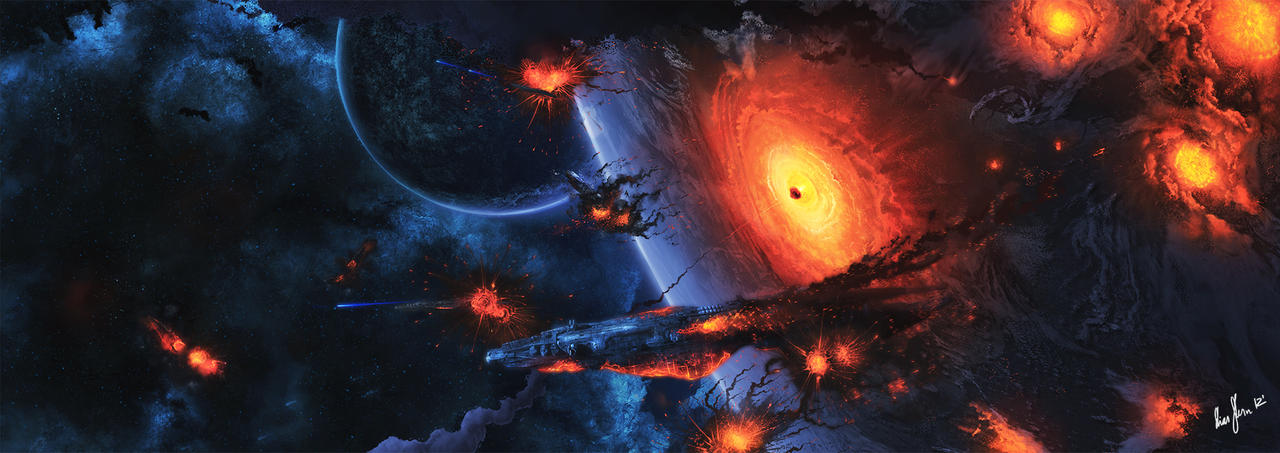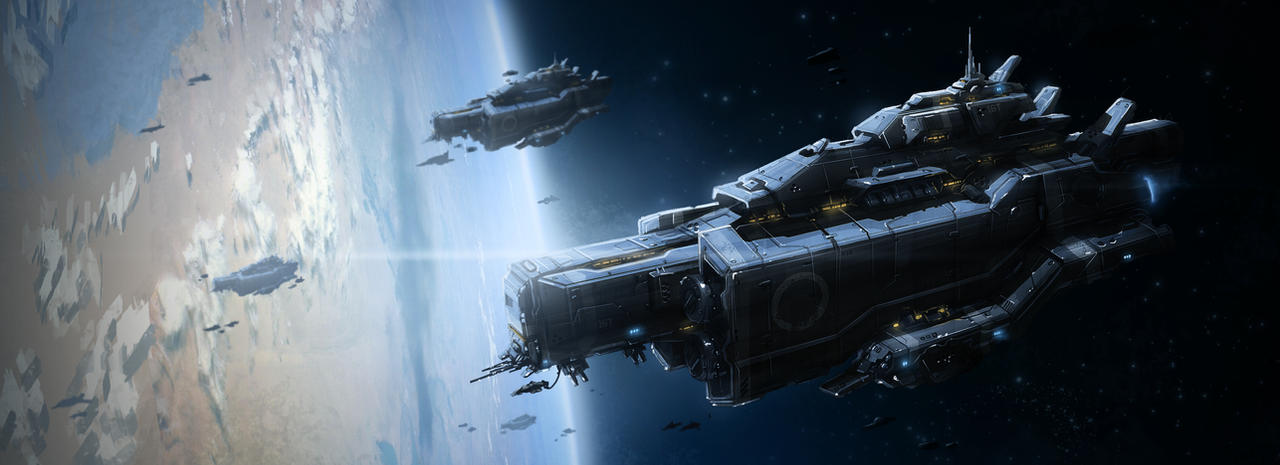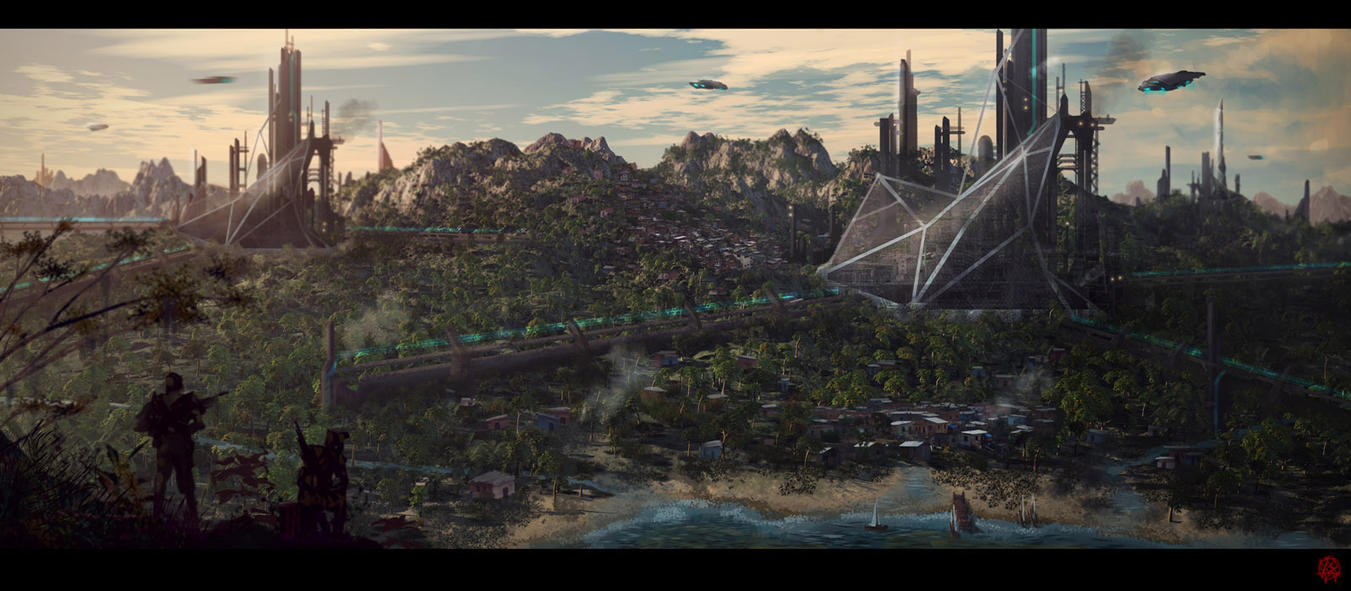
But look at us now....

The year is 2321 and, for decades now, the remnants of humanity have squandered in hiding, afraid. But it wasn't always so. It was only fifty years ago that mankind lived in a golden age marked by discovery and the establishment of vast colonies on the surface of dozens of planets. We settled every world we set foot on and our numbers grew. Our unquenchable thirst for conquest drove us ever-forth and our brave species spread throughout the cosmos, raising new civilizations from previously dead worlds. Our ingenuity and determination saw earthly plants sprout out from alien soil, breathing life to once barren planets for us to settle. We triumphed over challenges previously believed insurmountable, and we had, at last, conquered the final frontier. We were spread so far we thought ourselves immortal.
How wrong the The Listeners proved us.
Their advance was irrepressible. Inescapable. Where their ships went, life ceased to be. We were helpless to stop it. Our homeworld, Earth, fell first. Our stronghold among the stars.. our cradle. Billions of lives turned to ash, ancient cities turned to dust. We fought them hard, but we could not stop the inevitable. Our closest colonies fell next. One after the other, planet after planet. Loss after loss.
The extinction of the human race was happening before our very eyes. And we didn't even know who our eradicators were -- or what they were. All we knew was that they wouldn't stop until all of humanity had ceased to be. So we ran.
An order for full retreat was issued and what worlds we still held were abandoned. Left to die. Those who could reach the evacuation points watched as billions more perished while their ships set course for the darkest, most distant corners of human space. To safety.
After a dozen worlds were destroyed by The Listeners, it had become apparent that it was humanity's telecommunication signals that had led their otherworldly ships to Earth. By following the human race's bread crumb of radio signals sent echoing carelessly across the sky, their ships had found Earth first and every colony world thereafter in order of its establishment.
The remnants of humanity set course for the Epsilon Indi System on the outskirts of known space, where a hastily-prepared but promising plan to save what remained of mankind was to be executed.
The newly established colony of Nai Kolkata in the Epsilon Indi System, recognizing the peril while time remained to act, enacted a novel yet relatively simple plan to conceal themselves. In the farthest orbit of their parent star - well beyond the system's planets, they deployed a ring of autonomous stations whose purpose was to emit randomized radio waves in all directions of space. Out at the heliosheath of the system, these stations mimicked the background radio static of the universe itself - effectively cloaking the radio and telecommunications broadcasts of Brahma - the lush moon on which the colony was founded - and its neighboring worlds.
It was there that humanity hid.
One after another, interstellar transports filled with refugees poured into the small colony at Nai Kolkata. Overnight the quiet backwater sanctuary became a melting pot for the scared, lost, and broken remnants of a humanity that had only years before ruled the stars.
With them came the battered remains of the human military; a small fleet of survivors bearing the scars of their fight against the onslaught of The Listeners. More ships arrived in the following months, telling stories of worlds turned to ash, but their numbers remained low. It had become apparent that most of the human military had been destroyed or lost in the chaos.
An emergency military government was proposed and briefly enforced before their attempts to control a frightened population proved ineffective. They were too few to effectively govern and protect an entire system at once. Deciding it was more important to protect the colonists from those who had destroyed their home, the Guardian Fleet, as they became known, took on the task of patrolling the outskirts of the system, keeping a watchful eye for any sign of The Listeners' return. The Guardian Fleet enacted a series of strict laws prohibiting radio communications using electromagnetic frequencies above 30GHz while in space, and prohibited any ships from leaving the system in order to prevent detection by The Listeners. Those who attempted to escape faced deadly force.
On the surface of Brahma, colonists of Nai Kolkata opened their homes to the dispossessed. When there was no more room, streets filled with makeshift shelters as refugee ships continued to arrive. Fear and poverty turned to idleness and anger. Violence and crime became a problem in a colony that had once been peaceful. As years went by and the threat of an impending reemergence by The Listeners lessened, the original colonists pleaded for their old lives back, and the refugees resented them. Protests and riots grew rampant. Desperate, the colonists began to fund stock-companies with aims on colonizing other parts of the wild moon.
Mining ventures, plantations growing food from both the old world and this new one, and industrial enclaves were just a few of these early ventures. They pushed boundaries, creating an infrastructure while discovering ways to push back the wilderness. Successful colonists made their own fortunes, and with it they began to organize even more refugees. Some planned governments that would be havens for their ideologies and beliefs. Others wished to live amongst their own kind in a culture they were familiar with.
As humans began to cut their way into the jungles, encounters with the native bat-like peoples, the Tkrai, became more common. At first, the aliens were a fascinating subject for the colonists. Intelligent beings lived among them - the fact was amazing to most. But as time passed, the encounters became violent. Humans were, after all, destroying their home. Resentment and fear grew from this, but the two species would eventually coexist in the nations that came to be formed. But their coexistence isn't one without problems.
Fifty-one years have passed since the first refugees arrived. Since then, many nations have risen; all of them vying to form great civilizations like the ones of old. We stand at the beginning of a new age for human advancement. A world untamed and mysterious. A new beginning for mankind -- another frontier to conquer.

The golden age of humanity has reached an abrupt end, and our species has been forced into hiding by The Listeners. Humans now live on Brahma, a lush moon of the gas giant Brahmapura. Independent nations have been established on the surface of Brahma. Some are clustered inside the 'safe-zone', a region where humans are relatively safe from the moon's many dangers. Others have established their nations and city-states beyond the safe-zone's boundaries, where they are plagued by the constant threat of wildlife attacks and rebels. There, the many nations compete for dominance as they did hundreds of years ago on Earth.
Brahma's native bat-like people, the Tkrai, live alongside humans where they are allowed to. But not all of them are happy to be subservient to mankind -- some have taken up arms in rebellion against their new overlords. Others live lives as they did before the humans came; as primitive clans living deep in the jungles, or below the surface in vast cave systems created by sinkholes. But the Tkrai aren't the only ones with a score to settle. If the moon's gigantic predators weren't enough of a problem, human insurrectionists are a constant threat to the stability of Brahma's nations.
You can lead a nation or frontier settlement and compete against others. Play as an organization trying to reach untapped reserves of vital natural resources deep in the jungle. Perhaps you're one of the rebels fighting to topple an oppressive government. Or maybe you're an explorer with a humorous alien sidekick, braving the wilds to find hidden treasures. It's up to you.
This RP will include....
-1: A lush moon teeming with life, and an entire system to explore. Humanity's new home, Brahma, is a moon of the gas giant Brahmapura in the Epsilon Indi system. This is a wild moon with no shortage of dangers. Humans are not at the top of the food chain here; the moon is home to giant, monstrous predators once unimaginable to our human minds, but whom are now a constant threat to anyone brave enough to wander beyond the 'safe-zone'. With most of the moon uninhabited by humans, players have literally an entire world untouched and untamed for them to explore and fight over. No one knows what lies deep in the jungles - be the first to find out. But beware of the moon's many natural hazards. Thick jungles, unpredictable sinkholes, and strange alien natural phenomenons are but a few of the dangers you'll face out in the wild. Ah -- and steer clear of the moon's unwelcoming and uncivilized natives. They'll cut ye.
You're not just limited to exploring Brahma, though. Brahma is but one of many possible moons orbiting the gas giant Brahmapura. In addition to other moons, players can visit neighboring worlds. Perhaps you're a mining company looking to set up shop on a barren planet. Or maybe you just want to explore other worlds. You can do it, and maybe you'll uncover something in the dark corners of these mysterious worlds. But don't try to escape the system; the Guardian Fleet is ever-vigilant. When they catch you - and catch you they will - they'll shoot first and never ask questions.
-2: Character-centric, third-person roleplaying. We aren't looking for chessboard roleplaying where you simply say where things are and what they are doing (IE: "The Broian Army is moving south with five hundred spears and six hundred cat-tossers. The city is producing lots of copper wiring due to an industrial level of homeless crackheads living in the area"). We also don't want to see first-person, as first-person tends to get confusing in an RP setting like this. When roleplaying as a nation or organization, play out their actions through the eyes of characters affiliated to them.
-3: Many roleplaying options. You can play as a nation, an organization, or a single character. Players who choose to play as nations take control of small nations or city-states on Brahma. Those who want to play as an organization can take control of almost any kind of organization they want. PMC companies, humanitarian organizations, manufacturers, rebels, ect. If nations and organizations aren't your thing, you can always play as a single character. A simple colonist, a soldier, an explorer, ect.
-4: A sci-fi world with cool advanced technology. Robots, spaceships, all that. Almost everything you can expect from a futuristic space RP.

The red border is the 'safe-zone' where the safer, more prosperous nations are in. The blue circle inside is Nai Kolkata. This area may seem small, but keep in mind that Brahma is a little bigger than Earth. So the safe-zone may look small, but it's probably about the size of Europe.
The rest of the colors are:

- This is not a strategy RP. If you play as a nation, you will not be playing it through updates listing your progress (ie: wooden hut 80% done). Instead, you will be playing out the actions of your nation through the eyes of characters affiliated with it. If you are familiar with the 'A Song of Ice and Fire' book series, that's basically how you are expected to play your nation. You have dozens of characters with their own personalities and histories, and it is through them that you play out the actions of your nation. If you want to play out a war, you do so through the eyes of soldiers and commanders. If you want to explore your nation's culture, you may take control of one of your civilians to do so. If you still have doubts on how this will work, ask in OOC.
- This is not an advanced-only RP. This is not to say people capable of writing lengthy posts will be asked to tone it down a bit. No, we encourage lengthy, detailed posts. However, we will not require it. Intermediate-level writers are welcomed, as is anyone below that skill-level willing to push themselves in order to keep up and learn from more experienced writers. Two-paragraph minimum, but I encourage more.
- Do not play to win. It's not about who has the biggest army, or who is more badass. It's about telling a good story. Don't be afraid to lose a battle, or put yourself in a bad position. It's situations like those that good stories are made from. Nobody is going to care or like your nation/organization/individual if everything always goes their way and they're constantly swinging their dick around in triumph.
- If you choose to play as a city-state or nation beyond the 'safe-zone', be reasonable. Being outside of the 'safe-zone' means your city-state or nation is right in the middle of a lot of dangerous wilderness. Chances are they're not super prosperous. They might be doing well, but the farther they are from the safe-zone, the smaller the chances that they are a superpower of some kind. A good guideline to go by would be this: The nations inside the safe-zone are the safest and most prosperous, but being clustered inside the safe-zone, they have little room for expansion. The nations outside the safe-zone have plenty of room to expand, but they are plagued by problems, from wildlife to rebels, so they are probably not the wealthiest or most prosperous of nations.
- No nukes, among other similar things. It comes down to being reasonable, really. If you think what you're doing, or thinking of doing, is overpowered or unrealistic, don't do it. Or at least ask before you do it. See if other people agree with it.
- When in doubt, ask in the OOC.

You are allowed to play as a nation on Brahma, an organization (be it rebels, mercenaries, or a corporation) based there, or as an individual.
There is a 'safe-zone' marked on the map. Nations inside of that safe-zone are safer and more prosperous, but have little room for expansion. Nations and city-states outside of the safe-zone have plenty of room for expansion, but are more susceptible to attacks by Brahma's crazy wildlife and human-hating natives, and probably aren't as wealthy and prosperous as those inside the safe-zone. You may put your nation where you please.
Application templates:
If you want to add some sections to the templates, like flags or whatever, go ahead.
Disclaimer: None of the banners used in this post or the next were made by me. Credit goes to the owners who made them.
